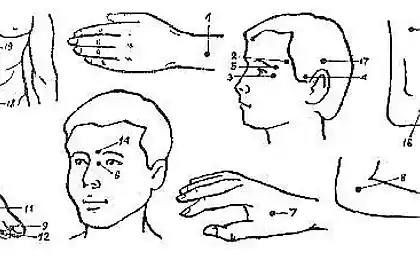622
Personal psychological border: the point where violence begins
First I want to define the two concepts.
Violence: any form of exposure to one person to another to force him against his will to do what is necessary to first
. Key points are: "any form", "target" (ie intent) and "against their will". I do not believe that a prerequisite for the determination of violence must be as stated in the WHO definition of "bodily injury, death, psychological trauma, developmental disorders or various kinds of damage».

© «Collection of a ray of hope," comedy drama by David O. Russell
Personal psychological boundary: a line between the "I / me" and "not-I / someone else." In the "I / me" fully and completely covered by the ownership of the media, "I", and no one else can manage it. Another thing is that people have personal boundaries of different width and, accordingly, different notions of what they can control, and what - no. For example, if formally my personal time / place does not feel like "my", then my time / place can easily seize the other, and I will not shew resistance. Secure with (aggression), only that part inside the psychological boundaries. If they are awfully close - even in this man's life very easy to press. In extreme cases, the "I / me" does not apply even to formally own body.
I sometimes (depending on the current context) offer customers or students carry out an experiment in a pair. One of the "partners" chooses a place in the room and mentally draw the line around itself, within which the "I". Once he does (and does not tell anyone about where the border), the second begins to approach, and the first task - to stop it as soon as he comes to the border. And here appear different phenomena of interaction between two people.
Someone approaching very much worried about the comfort of waiting, and stopped himself, sometimes in just a few steps from the mental boundaries. One of the pending easily say "wait, can not go on," and the right stop safely. There were situations where waiting as we approach the second "partner" was starting to get nervous, worried, but did not give to know what they say, dear, you crossed the border. Some upcoming noticed nervousness themselves hampered (or walked less and less confident), some quietly walked right on collision, and at this moment waiting began to back away, but still did not want any gesture or word to stop those who are clearly invaded beyond the established boundaries mentally. At such moments, some of the upcoming stop, and some went further, wondering what was going on.
There was an extreme case, when approaching a man just ignored the words and gestures of the woman "stop!", Explaining that "I wanted to go, and I did what I wanted and why she will be to me to dictate what to do, and what is not? ". In the mind of this man is absolutely no other people's personal boundaries as a fact, even when he is on the "head" level know that these limits have (and in response to a comment that he's made a little present rape, dismissed rape is another, I'm not a pervert some!) Finally, in some cases, the waiting / schaya generally does not show outwardly / a reaction to the violation.
After this experiment inevitably asked: what do you feel / and when your partner was coming to you? And what happened to you when you are approaching? How you got along with your experiences? What caused you to endure the discomfort, but do not give a response to the invasion of personal boundaries? What prompted you to come nearer and nearer, despite the fact that you knew / felt already got on someone else's territory?
The discussion for many partners are often a real discovery is the fact that they both took an active part in creating an uncomfortable situation, if any. Just "victims" and simply "rapists" almost was not, except for example with complete ignore the response of women, where roles were clearly defined. And so - a rigid division into "good" and "bad" conduct could not always. Answers to the questions posed above were different. And they give a clue as to where it ends healthy interaction and violence begins. You can select several options.
A) Hypersensitivity to other people's boundaries: then do not come into contact with another person and do not indicate their interests / needs, aimed at another, because I'm afraid to make him uncomfortable. "Hypersensitivity" often have people who have lived a long time with those who have personal boundaries inordinately inflated, and any "extra" movement of the other was perceived as an attack. Hence habit squeezed himself and "giperuvazhat" other, completely suppressing their own initiative. As a consequence - holey personal boundaries that are easy to crush or ignore, because differently from them uncomfortable
. B) The ability to contact at the interface. Two people approaching their personal boundaries collide and they give to know about it. Here is mine, and here is mine, here are my desires, but my desires. There is a normal demarcation, "lapping". It is possible, however, only when both partners talk about themselves, their needs and desires, and thus have a choice of which partner needs they are ready to meet, and what - no. During the contact people are constantly checking each other's boundaries.
For example, to do something that you think is enjoyable to another, without asking for it - this is a test of the border. If another reacted with anger - you just crossed the border, "he caused good" and here it is important to file back and determine the order in which the line will be carried out. But what happened - it is not violence, it's just a breach of personal boundaries, which can occasionally occur in people of any
. I gave an example of some ridiculous and very uncomfortable gifts, one of them - a rabbit. Grandma gave her little granddaughter live rabbit, not taking into account the fact that the need to care for a rabbit to her daughter, the mother of a happy owner of a living toy. Mom had to take care of a few years, but if this situation of violence? Mom not refuse to accept this rabbit by the joy of a child, rather than their own needs. Nothing pleasant is not in this situation, but it is not violence: the choice to give up was, however, the price was quite high for him, and the border at the time were not marked. It should be remembered that the situation is a false choice: you sort of asking for something, but the response is ignored and people still goes its own way.
Thus, the contact at the border sometimes leads to the fact that we are breaking the boundaries of others, and that's fine. Violation makes only one who did not come into contact.
B) Failure to clearly defined boundaries of others. If someone is clearly expressed: "so I can be as well - it is impossible", while the second continues to do (or try to do) what you want it - violence starts from this point. And here there are no other options. "Today I do not want to have sex" - "Well, okay, then you should!" From the moment that sounded "I do not want to have sex!" - All further attempts to initiate sex are attempts to invade the territory, which is closed. Why it is closed (she does not want sex) - is another matter, and the ability to pin on the border of both partners, it can be resolved. And defensive aggression is - a normal and natural reaction
. "Deeds" too often become a form of violence. I know the story, in which the father decided to "do much good," his daughter, and when she was on vacation for two weeks a team of workers hired by his father, completely remade her apartment in accordance with the ideas of his father. No one daughter did not ask, of course, she wants it or not, but the choice - to take or not take - it did not have. It has been put before the fact. Father simply to satisfy their need for the expense of daughters. In fact it is - a symbolic rape, that is, the penetration depth of personal (even intimate) territory without the permission of the victim, and even in the "unconscious" of her condition. In this case, the boundaries are clearly marked and they have been violated.
Food abuse, financial abuse - any form of cooperation, in which one partner is doing to others what he wants, ignoring the will of another, are violent. Tactless remarks and comparisons, depreciation, unsolicited advice - all this being a violation of personal boundaries, violence itself is not, but becomes one when the right was told: do not compare me with Zhenya and Sasha, it offends me. I do not want you to give me / and advice, if need be - ask
. One of the border zones here is a flirt. The convergence of men and women involves penetration abroad, and it is very important sensitivity to each other, to the responses to each cautious step forward. A simple valve to reach women or men for the "Places of Interest" (a woman may also prodelyvat) leaves no choice, and it is violence with all its reactions to it.
It is not always a partner have the capacity and the resources to react or resist, novozmozhnost directly indicate their relation is always.
D) Uncertain or unmarked personal boundaries. One or both partners may not clearly indicate their attitude to this or that fact. For instance, a man wants sex, and a woman answered very vaguely says "maybe", "look", "well-oo-oo-oo," "probably," and so on. And non-verbal messages, too, are dual.
These vague words and gestures do not mean any refusal or consent, and, in fact, the treatment is given at the mercy of the initiator of sex. And he wants sex, and then can interpret it from the position desired for him, which is natural. "Yeah, you have to be more assertive, she is waiting for this!" (It is not marked, then she waits). It is unclear where the check boxes. In the absence of direct feedback, people often begin to look for some external criteria, which would enable the partner to understand.
And among them are stereotypes about the "proper" masculine or feminine behavior, cultural norms (three times offer - twice give up, demonstrate modesty, the third consent), the advice of friends and girlfriends. Focusing on external criteria to anything good does not: contact not real people, and walking stereotypes. Is it then any ongoing initiative is male violence? No. He selects suitable for him options in uncertain conditions, sometimes based even on past experience, when, to take the initiative, he met the response, but stopping it be suddenly faced with insult ... A cockroach in my head sits on cockroaches and cockroach chases, that man, that woman.
(№1 warning for those who are in the tank: the injured person the accusation that he is to blame for the violence on a person by another - is unacceptable, and is "perfect" excuse for the perpetrator perpetrator of violence is solely the blame and responsibility for it. and with respect to the victims we can talk only about his / her responsibility for the protection of personal boundaries, but not for violence).
The reasons why it is difficult to mark their borders, are different. Someone is afraid to hurt someone just afraid for his life and health because of past experience. Someone is manipulating, playing their games. (№2 warning for those who are in the tank: not always a person can find the psychological resources to counter violence or to distinguish their boundaries, so the fact of knowledge about how to protect their borders, can not help Finding these resources is often a challenge. psychotherapy).
There is another option of rapprochement. When both partners closer together, asked: how do you have at this distance? Can I get closer? In everyday life, this means attention to the feelings and needs of others. How to make a miserable partner? Forget about the fact that he has his own territory, and he sets the rules himself in that territory. You can try to agree on new rules, but do not push. Since punching (entreaties, ignore) the dialogue is terminated and the violence begins.
And it has no gender.
P.S. Regarding point G. Very often it happens that a man is automatically assigned to the rape, if he continues to lead in response to the uncertainty. However, a significant number of men, extending the initiative and finding that the "Well-at" hiding "no" (for non-verbal reactions), will stop because it's not fucking exciting. And it feels rapists due to the fact that, without seeing clearly, "I do not want", decided to go on about the stereotypes or past experience (where it is "well ..." meant "podomogaysya me yet, my dear, I like it "). And they denied the right to cockroaches in my head, like "undetermined" girls.
P.P.S. In general, I wonder how the discussion quickly slipped to rape and normal search of the one who is guilty and who is the victim, and it is impossible to talk about mutual responsibility, because rape ... (as if other contexts between men and women, except for rape, no) . Who wants to see that in the text - the saw.
Author: Ilya Latypov
Violence: any form of exposure to one person to another to force him against his will to do what is necessary to first
. Key points are: "any form", "target" (ie intent) and "against their will". I do not believe that a prerequisite for the determination of violence must be as stated in the WHO definition of "bodily injury, death, psychological trauma, developmental disorders or various kinds of damage».

© «Collection of a ray of hope," comedy drama by David O. Russell
Personal psychological boundary: a line between the "I / me" and "not-I / someone else." In the "I / me" fully and completely covered by the ownership of the media, "I", and no one else can manage it. Another thing is that people have personal boundaries of different width and, accordingly, different notions of what they can control, and what - no. For example, if formally my personal time / place does not feel like "my", then my time / place can easily seize the other, and I will not shew resistance. Secure with (aggression), only that part inside the psychological boundaries. If they are awfully close - even in this man's life very easy to press. In extreme cases, the "I / me" does not apply even to formally own body.
I sometimes (depending on the current context) offer customers or students carry out an experiment in a pair. One of the "partners" chooses a place in the room and mentally draw the line around itself, within which the "I". Once he does (and does not tell anyone about where the border), the second begins to approach, and the first task - to stop it as soon as he comes to the border. And here appear different phenomena of interaction between two people.
Someone approaching very much worried about the comfort of waiting, and stopped himself, sometimes in just a few steps from the mental boundaries. One of the pending easily say "wait, can not go on," and the right stop safely. There were situations where waiting as we approach the second "partner" was starting to get nervous, worried, but did not give to know what they say, dear, you crossed the border. Some upcoming noticed nervousness themselves hampered (or walked less and less confident), some quietly walked right on collision, and at this moment waiting began to back away, but still did not want any gesture or word to stop those who are clearly invaded beyond the established boundaries mentally. At such moments, some of the upcoming stop, and some went further, wondering what was going on.
There was an extreme case, when approaching a man just ignored the words and gestures of the woman "stop!", Explaining that "I wanted to go, and I did what I wanted and why she will be to me to dictate what to do, and what is not? ". In the mind of this man is absolutely no other people's personal boundaries as a fact, even when he is on the "head" level know that these limits have (and in response to a comment that he's made a little present rape, dismissed rape is another, I'm not a pervert some!) Finally, in some cases, the waiting / schaya generally does not show outwardly / a reaction to the violation.
After this experiment inevitably asked: what do you feel / and when your partner was coming to you? And what happened to you when you are approaching? How you got along with your experiences? What caused you to endure the discomfort, but do not give a response to the invasion of personal boundaries? What prompted you to come nearer and nearer, despite the fact that you knew / felt already got on someone else's territory?
The discussion for many partners are often a real discovery is the fact that they both took an active part in creating an uncomfortable situation, if any. Just "victims" and simply "rapists" almost was not, except for example with complete ignore the response of women, where roles were clearly defined. And so - a rigid division into "good" and "bad" conduct could not always. Answers to the questions posed above were different. And they give a clue as to where it ends healthy interaction and violence begins. You can select several options.
A) Hypersensitivity to other people's boundaries: then do not come into contact with another person and do not indicate their interests / needs, aimed at another, because I'm afraid to make him uncomfortable. "Hypersensitivity" often have people who have lived a long time with those who have personal boundaries inordinately inflated, and any "extra" movement of the other was perceived as an attack. Hence habit squeezed himself and "giperuvazhat" other, completely suppressing their own initiative. As a consequence - holey personal boundaries that are easy to crush or ignore, because differently from them uncomfortable
. B) The ability to contact at the interface. Two people approaching their personal boundaries collide and they give to know about it. Here is mine, and here is mine, here are my desires, but my desires. There is a normal demarcation, "lapping". It is possible, however, only when both partners talk about themselves, their needs and desires, and thus have a choice of which partner needs they are ready to meet, and what - no. During the contact people are constantly checking each other's boundaries.
For example, to do something that you think is enjoyable to another, without asking for it - this is a test of the border. If another reacted with anger - you just crossed the border, "he caused good" and here it is important to file back and determine the order in which the line will be carried out. But what happened - it is not violence, it's just a breach of personal boundaries, which can occasionally occur in people of any
. I gave an example of some ridiculous and very uncomfortable gifts, one of them - a rabbit. Grandma gave her little granddaughter live rabbit, not taking into account the fact that the need to care for a rabbit to her daughter, the mother of a happy owner of a living toy. Mom had to take care of a few years, but if this situation of violence? Mom not refuse to accept this rabbit by the joy of a child, rather than their own needs. Nothing pleasant is not in this situation, but it is not violence: the choice to give up was, however, the price was quite high for him, and the border at the time were not marked. It should be remembered that the situation is a false choice: you sort of asking for something, but the response is ignored and people still goes its own way.
Thus, the contact at the border sometimes leads to the fact that we are breaking the boundaries of others, and that's fine. Violation makes only one who did not come into contact.
B) Failure to clearly defined boundaries of others. If someone is clearly expressed: "so I can be as well - it is impossible", while the second continues to do (or try to do) what you want it - violence starts from this point. And here there are no other options. "Today I do not want to have sex" - "Well, okay, then you should!" From the moment that sounded "I do not want to have sex!" - All further attempts to initiate sex are attempts to invade the territory, which is closed. Why it is closed (she does not want sex) - is another matter, and the ability to pin on the border of both partners, it can be resolved. And defensive aggression is - a normal and natural reaction
. "Deeds" too often become a form of violence. I know the story, in which the father decided to "do much good," his daughter, and when she was on vacation for two weeks a team of workers hired by his father, completely remade her apartment in accordance with the ideas of his father. No one daughter did not ask, of course, she wants it or not, but the choice - to take or not take - it did not have. It has been put before the fact. Father simply to satisfy their need for the expense of daughters. In fact it is - a symbolic rape, that is, the penetration depth of personal (even intimate) territory without the permission of the victim, and even in the "unconscious" of her condition. In this case, the boundaries are clearly marked and they have been violated.
Food abuse, financial abuse - any form of cooperation, in which one partner is doing to others what he wants, ignoring the will of another, are violent. Tactless remarks and comparisons, depreciation, unsolicited advice - all this being a violation of personal boundaries, violence itself is not, but becomes one when the right was told: do not compare me with Zhenya and Sasha, it offends me. I do not want you to give me / and advice, if need be - ask
. One of the border zones here is a flirt. The convergence of men and women involves penetration abroad, and it is very important sensitivity to each other, to the responses to each cautious step forward. A simple valve to reach women or men for the "Places of Interest" (a woman may also prodelyvat) leaves no choice, and it is violence with all its reactions to it.
It is not always a partner have the capacity and the resources to react or resist, novozmozhnost directly indicate their relation is always.
D) Uncertain or unmarked personal boundaries. One or both partners may not clearly indicate their attitude to this or that fact. For instance, a man wants sex, and a woman answered very vaguely says "maybe", "look", "well-oo-oo-oo," "probably," and so on. And non-verbal messages, too, are dual.
These vague words and gestures do not mean any refusal or consent, and, in fact, the treatment is given at the mercy of the initiator of sex. And he wants sex, and then can interpret it from the position desired for him, which is natural. "Yeah, you have to be more assertive, she is waiting for this!" (It is not marked, then she waits). It is unclear where the check boxes. In the absence of direct feedback, people often begin to look for some external criteria, which would enable the partner to understand.
And among them are stereotypes about the "proper" masculine or feminine behavior, cultural norms (three times offer - twice give up, demonstrate modesty, the third consent), the advice of friends and girlfriends. Focusing on external criteria to anything good does not: contact not real people, and walking stereotypes. Is it then any ongoing initiative is male violence? No. He selects suitable for him options in uncertain conditions, sometimes based even on past experience, when, to take the initiative, he met the response, but stopping it be suddenly faced with insult ... A cockroach in my head sits on cockroaches and cockroach chases, that man, that woman.
(№1 warning for those who are in the tank: the injured person the accusation that he is to blame for the violence on a person by another - is unacceptable, and is "perfect" excuse for the perpetrator perpetrator of violence is solely the blame and responsibility for it. and with respect to the victims we can talk only about his / her responsibility for the protection of personal boundaries, but not for violence).
The reasons why it is difficult to mark their borders, are different. Someone is afraid to hurt someone just afraid for his life and health because of past experience. Someone is manipulating, playing their games. (№2 warning for those who are in the tank: not always a person can find the psychological resources to counter violence or to distinguish their boundaries, so the fact of knowledge about how to protect their borders, can not help Finding these resources is often a challenge. psychotherapy).
There is another option of rapprochement. When both partners closer together, asked: how do you have at this distance? Can I get closer? In everyday life, this means attention to the feelings and needs of others. How to make a miserable partner? Forget about the fact that he has his own territory, and he sets the rules himself in that territory. You can try to agree on new rules, but do not push. Since punching (entreaties, ignore) the dialogue is terminated and the violence begins.
And it has no gender.
P.S. Regarding point G. Very often it happens that a man is automatically assigned to the rape, if he continues to lead in response to the uncertainty. However, a significant number of men, extending the initiative and finding that the "Well-at" hiding "no" (for non-verbal reactions), will stop because it's not fucking exciting. And it feels rapists due to the fact that, without seeing clearly, "I do not want", decided to go on about the stereotypes or past experience (where it is "well ..." meant "podomogaysya me yet, my dear, I like it "). And they denied the right to cockroaches in my head, like "undetermined" girls.
P.P.S. In general, I wonder how the discussion quickly slipped to rape and normal search of the one who is guilty and who is the victim, and it is impossible to talk about mutual responsibility, because rape ... (as if other contexts between men and women, except for rape, no) . Who wants to see that in the text - the saw.
Author: Ilya Latypov























